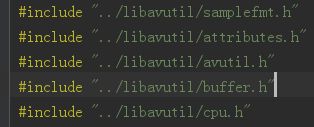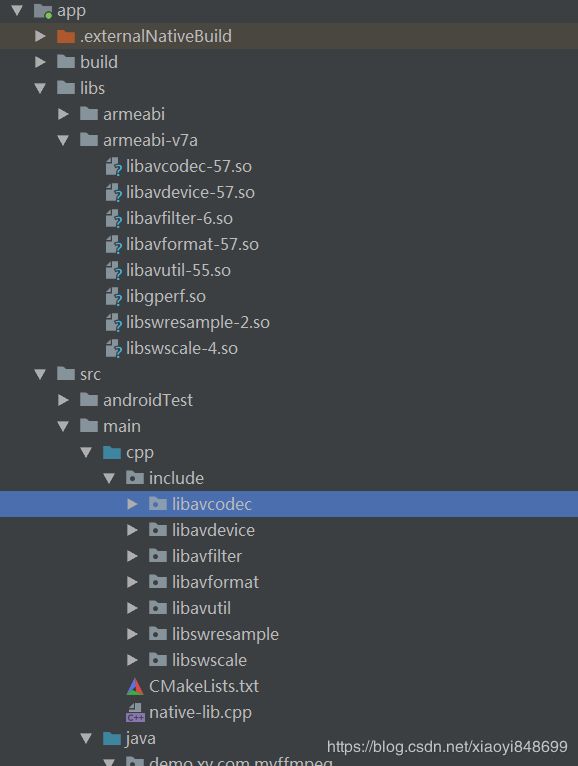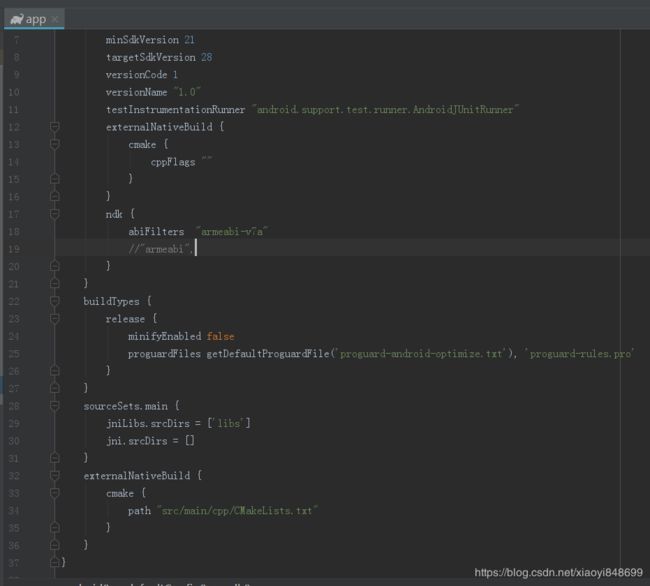导入FFmpeg遇到的各种问题
问题1:java.lang.UnsatisfiedLinkError: dlopen failed: file offset for the library
一般原因是libs下.so库文件损坏,重新拷贝放入即可
问题2: error: undefined reference to
引入头文件需要写到extern "c"里面才行
问题3:目录so库找不到 ninja: error: '/libavutil-55.so', needed by 'E:/xy/hly/MyFFmpeg/app/build/intermediates/cmake/debug/obj/armeabi-v7a/libnative-lib.so', missing and no known rule to make it
在CMakeList.txt文件中设置的.so库路径错误,参考如下(注意:CMakeList.txt的位置,新版本自动生成的CMakeList.txt再cpp目录下)不正确参考错误日志修改路径正确即可
问题4:include头文件引入位置错误
导入的include头文件报错,在我的项目里是将include文件加拷贝放在cpp目录下,然后用统一替换功能在导入位置前面加../,如下图
目录结构如下:
native-lib.cpp文件
#include
#include
extern "C"
{
//写里面才行
#include "include/libavformat/avformat.h"
#include "include/libavcodec/avcodec.h"
#include "include/libavutil/avutil.h"
#include "include/libavfilter/avfilter.h"
jstring
Java_demo_xy_com_myffmpeg_MainActivity_stringFromJNI(
JNIEnv* env,
jobject /* this */) {
std::string hello = "Hello from C++";
return env->NewStringUTF(hello.c_str());
}
jstring
Java_demo_xy_com_myffmpeg_MainActivity_urlprotocolinfo(
JNIEnv *env, jobject) {
char info[40000] = {0};
av_register_all();
struct URLProtocol *pup = NULL;
struct URLProtocol **p_temp = &pup;
avio_enum_protocols((void **) p_temp, 0);
while ((*p_temp) != NULL) {
sprintf(info, "%sInput: %s\n", info, avio_enum_protocols((void **) p_temp, 0));
}
pup = NULL;
avio_enum_protocols((void **) p_temp, 1);
while ((*p_temp) != NULL) {
sprintf(info, "%sInput: %s\n", info, avio_enum_protocols((void **) p_temp, 1));
}
return env->NewStringUTF(info);
}
jstring
Java_demo_xy_com_myffmpeg_MainActivity_avformatinfo(
JNIEnv *env, jobject) {
char info[40000] = {0};
av_register_all();
AVInputFormat *if_temp = av_iformat_next(NULL);
AVOutputFormat *of_temp = av_oformat_next(NULL);
while (if_temp != NULL) {
sprintf(info, "%sInput: %s\n", info, if_temp->name);
if_temp = if_temp->next;
}
while (of_temp != NULL) {
sprintf(info, "%sOutput: %s\n", info, of_temp->name);
of_temp = of_temp->next;
}
return env->NewStringUTF(info);
}
jstring
Java_demo_xy_com_myffmpeg_MainActivity_avcodecinfo(
JNIEnv *env, jobject) {
char info[40000] = {0};
av_register_all();
AVCodec *c_temp = av_codec_next(NULL);
while (c_temp != NULL) {
if (c_temp->decode != NULL) {
sprintf(info, "%sdecode:", info);
} else {
sprintf(info, "%sencode:", info);
}
switch (c_temp->type) {
case AVMEDIA_TYPE_VIDEO:
sprintf(info, "%s(video):", info);
break;
case AVMEDIA_TYPE_AUDIO:
sprintf(info, "%s(audio):", info);
break;
default:
sprintf(info, "%s(other):", info);
break;
}
sprintf(info, "%s[%10s]\n", info, c_temp->name);
c_temp = c_temp->next;
}
return env->NewStringUTF(info);
}
jstring
Java_demo_xy_com_myffmpeg_MainActivity_avfilterinfo(
JNIEnv *env, jobject) {
char info[40000] = {0};
avfilter_register_all();
AVFilter *f_temp = (AVFilter *)avfilter_next(NULL);
while(f_temp != NULL) {
sprintf(info, "%s%s\n", info, f_temp->name);
f_temp = f_temp->next;
}
return env->NewStringUTF(info);
}
}





